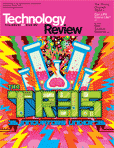|
Friday, August 24, 2007 Two-Sided Touch ScreenContinued from page 1 By Kate Greene
As touch screens shrink, says Scott Klemmer, a professor of computer science at Stanford University, one of the biggest problems users face is inadvertently covering up content with their fingers. LucidTouch, he says, "distinguishes itself in two ways: first, it provides better feedback about where you are ... and the other distinction is that it's multitouch." Even with their prototype's cumbersome design, the researchers were able to write applications for it and gather user responses from a small group. Depending on the application, users found that touching the back of the screen could be useful. For instance, most preferred to type on a Qwerty keypad using the front of the screen. But when the keypad was split down the middle, and one half was placed vertically along each side of the screen, most preferred to type on the back of the device. Half of the participants preferred using the back of the device for tasks such as dragging objects and navigating maps. The users were also divided on whether the superimposed images of their fingers were helpful. Two-thirds of the participants preferred the superimposed images when using the keyboard and dragging objects, and half preferred them while using the map. These results suggest that a user's preference for LucidTouch and pseudo-transparency depends on the application. Baudisch suspects that one of the first places that this technology could appear is in portable gaming, where specific games could be written for the technology. But importantly, it could enable people to start thinking differently about the potential of multitouch screens on handhelds. "I think--zooming out for a moment--what's really exciting about this time is that for so many years, we've seen the dominance of the mouse," says Stanford's Klemmer. "I think that hegemonic situation is now over. What this points to for me is the idea that we're going to see this increased diversity of devices that adapt to different situations." |
 |
||||||
|
||||||





Comments